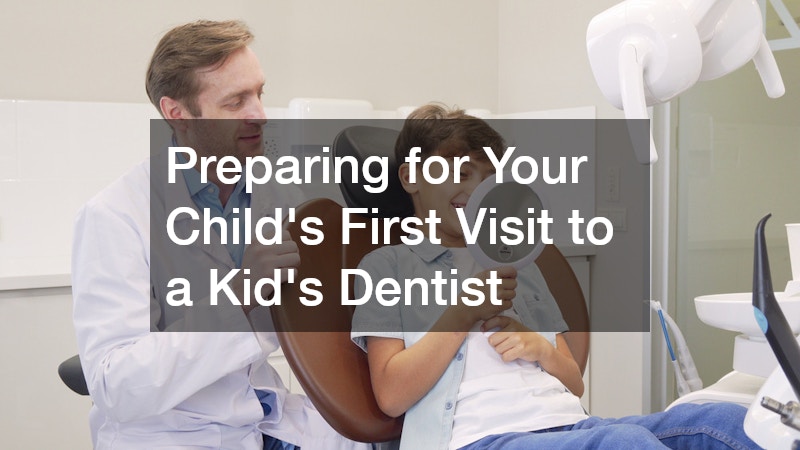
A child’s first dental visit is a significant milestone in their journey toward lifelong oral health. For many parents, this event can bring both excitement and anxiety—especially if they’re unsure what to expect. The good news is that with the right preparation and mindset, you can help your child feel comfortable, confident, and even excited about visiting the dentist. In this article, we will explore how to prepare for your child’s first dental visit and discuss what to expect. Understanding what you will find at a kids dentist will help ease any apprehension and make the visit a positive experience for both you and your child.
How Can I Prepare My Child for the Visit?
Discussing the Dentist Visit with Your Child
Communication is key when it comes to preparing your child for their first dental visit. Start by explaining, in simple and positive terms, what a dentist does.
Avoid using words that might cause fear, such as “drill,” “shot,” or “hurt.” Instead, emphasize that the dentist is a friendly helper who keeps their teeth strong and healthy. Describe the visit as an adventure—one where the dentist counts their teeth and helps them have a “super smile.” Children are naturally curious, so letting them ask questions about the visit can help them feel more involved and less anxious.
Role-Playing Dental Checkups at Home
Children often learn best through play, and role-playing a dental visit can be a fun and effective way to prepare. Use a toothbrush and a small mirror to “examine” your child’s teeth, pretending to be the dentist. Then switch roles and let your child be the dentist for you or one of their stuffed animals. This game helps familiarize them with the idea of someone looking into their mouth and teaches them what to expect during the appointment. The more familiar the process feels, the less intimidating it will be in the dental office.
Choosing the Right Appointment Time
Timing can make a big difference in how smoothly your child’s first dental visit goes. Try to schedule the appointment for a time of day when your child is well-rested, fed, and generally in a good mood—often in the morning. Avoid naptime or mealtimes, as a tired or hungry child may have a harder time cooperating. For very young children, morning appointments tend to work best because they are typically more alert and calm earlier in the day.
Books and Resources to Prepare Kids
Children’s books and educational videos about visiting the dentist can help normalize the experience and make it seem more exciting. Books like The Berenstain Bears Visit the Dentist or Peppa Pig: Dentist Trip introduce the concept in a lighthearted and friendly way. You can read these together before bedtime in the weeks leading up to the appointment. Many pediatric dental offices also have online resources or short videos designed to familiarize kids with what happens during a visit.
Addressing Your Child’s Fears and Anxieties
Even with preparation, some children may still feel nervous. It’s important to acknowledge their feelings rather than dismiss them. Reassure your child that it’s okay to be a little scared and that the dentist and their team are there to make sure they’re safe and comfortable. Sharing your own positive dental experiences—or even watching videos of other children having fun at the dentist—can also help calm their fears.
What Happens During the First Dental Visit?
Initial Examination and Procedure Expectations
During the first visit, the dentist’s primary goal is to help your child feel at ease while performing a gentle examination of their mouth. The dentist will check the teeth, gums, and bite to ensure everything is developing properly. They’ll look for signs of cavities, discuss proper brushing and flossing habits, and may clean the teeth if your child is comfortable. For infants or toddlers, the exam may take place with the parent holding the child in their lap, while older children usually sit in the dental chair.
Introduction to Dental Tools and Equipment
Pediatric dentists are trained to introduce dental tools in a fun, non-threatening way. They might show your child the small mirror used to “count teeth” or the water sprayer that “gives teeth a bath.” These gentle introductions demystify the process and help kids feel more comfortable with the unfamiliar sights and sounds of the dental office. The dentist may even let your child touch or see the tools before using them, creating a sense of curiosity rather than fear.
Common Questions the Dentist Might Ask
During the visit, the dentist will likely ask about your child’s medical history, diet, and oral hygiene habits. They may inquire about thumb-sucking, bottle use, or pacifier habits, as these can affect tooth development. Parents should be ready to discuss brushing routines and any concerns about teething or fluoride use. These questions help the dentist tailor advice to your child’s specific needs and establish a foundation for good oral care practices at home.
Duration of the First Visit and Follow-Up
The first dental appointment typically lasts between 30 and 45 minutes, depending on the child’s age and comfort level. The dentist will take their time to ensure the experience feels calm and friendly. At the end of the visit, you’ll receive recommendations for ongoing care and a suggested schedule for follow-up visits, usually every six months.
How a Pediatric Dentist Eases the Experience
Pediatric dentists specialize in treating children and use techniques specifically designed to make dental visits enjoyable. Their offices often feature bright colors, toys, and decorations that create a welcoming atmosphere. Many pediatric dentists also use positive reinforcement, distraction techniques, and gentle communication styles to ensure your child feels safe and supported. These professionals understand that building trust early on leads to better long-term dental habits.
How Can I Ensure a Successful Dental Visit?
Maintaining a Positive Attitude
Children are highly perceptive and can pick up on their parents’ emotions. If you appear anxious about the visit, your child may mirror that fear. Instead, maintain a calm and cheerful attitude. Use encouraging words and praise your child for being brave. Present the visit as something fun and special rather than a chore.
Rewards and Incentives for Bravery
A small reward can go a long way in helping your child associate the dentist with positive feelings. Many dental offices offer stickers or small toys after a visit, but you can also plan your own reward—like a trip to the park or their favorite treat. These simple incentives reinforce the idea that going to the dentist is something to look forward to.
Continuing Dental Hygiene at Home
The first dental visit is only the beginning of a lifelong journey toward good oral health. Encourage your child to brush twice a day with a soft-bristled toothbrush and a pea-sized amount of fluoride toothpaste. Supervise their brushing until they are old enough to do it effectively on their own, usually around age six or seven. Brushing can be a fun family routine, as can playing music or brushing together.
Setting Future Dental Appointments
Consistency is key to maintaining good oral health. Be sure to schedule regular dental checkups every six months. This not only allows the dentist to monitor your child’s development but also helps your child become comfortable with routine visits. Regular checkups reduce the risk of cavities and make dental care a normal part of life rather than something to fear.
Building a Relationship with the Dentist
A trusted relationship between your child, your family, and the dentist lays the foundation for a lifetime of healthy smiles. Encourage your child to talk openly with their dentist and share any concerns. Over time, the dental office will feel like a familiar, friendly place rather than something to be nervous about.
Conclusion
Preparing for your child’s first visit to the dentist can be a smooth and stress-free process with a little preparation and understanding. By talking openly about what to expect, choosing the right timing, and maintaining a positive attitude, parents can help ease any fears their child might have. A gentle introduction to dental care at an early age builds trust and confidence, essential ingredients for maintaining lifelong oral health. With your support and a caring pediatric dentist, your child can look forward to every visit with a smile.

